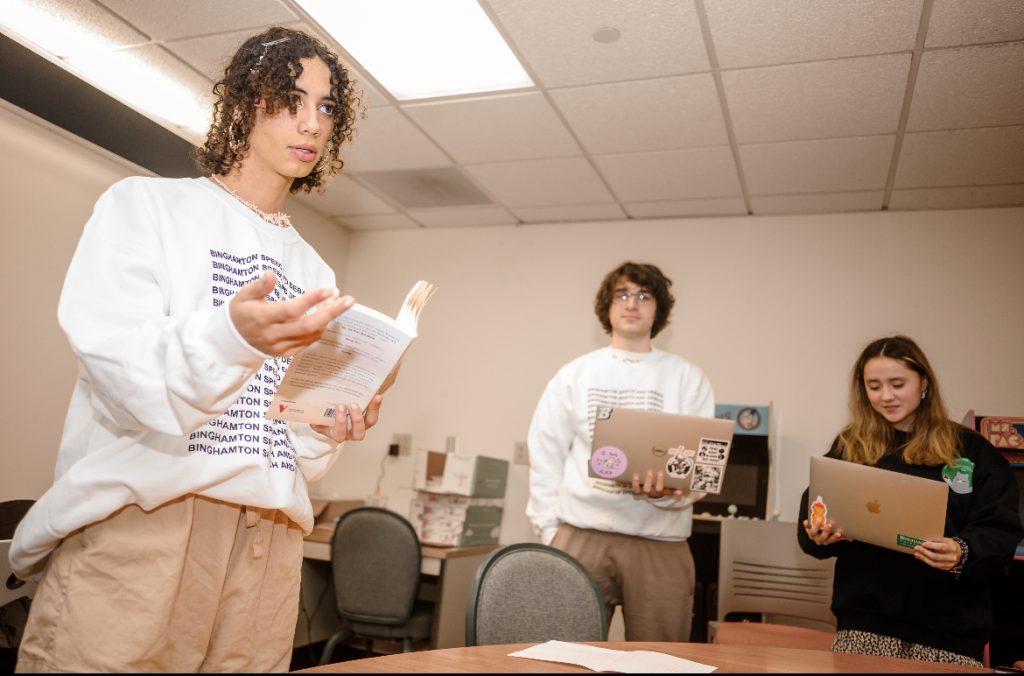The Binghamton University speech and debate team earned “historic” tournament success during the fall 2022 season.
The speech and debate team focuses on policy debate with three internal divisions — varsity, junior varsity (JV) and novice. During the fall, both the varsity and JV squads won the West Point Debate Tournament, and multiple teams advanced to the elimination phase of a national tournament at Wake Forest University. In addition, two of the top 10 best individual speakers at the University of Kentucky’s national tournament were BU students. The team faced nationally recognized debate programs and competitive tournament pools.
Joe Schatz, the director of speech and debate and a lecturer in the English department, described what factors made the team stronger and more versatile than prior iterations.
“Unlike in past years, the majority of our ranking is the result of our varsity team members at national tournaments beating the top teams from other debate programs,” Schatz wrote in an email. “This year our success is the result of not just having a good squad all around, but because we have some really top-tier debaters in varsity. Our success comes from our hard work, our unique approach to debate using critiques and because of the dedication of our students.”
The BU team is currently ranked seventh in the nation. According to the speech and debate website, the team has consistently been in the national top-ranks by the Cross-Examination Debate Association (CEDA). In 2008, the team attained the number-one ranking.
Compared to other universities, the speech and debate program at BU is marked by investment in novice debaters. Schatz characterized other competitors as hesitant to invest in inexperienced students, instead prioritizing spending on traveling and scholarships. The team’s website lists “[making] champions out of competitors with no prior experience” as one of its accomplishments.
Sonnie Picallo, the team captain and a junior majoring in philosophy, described their thoughts on the rigors of debating, and how the team has found success on the national level.
“A big misconception about debate is that it’s a club,” Piccolo wrote in an email. “It is an incredibly demanding activity. We are competing against Ivy Leagues with twice our budget, and we argue things that people don’t want to hear. It can be exhausting when it isn’t exhilarating. It’s rigorous work, but I couldn’t ask for better people to work alongside.”
According to Schatz, the leadership of the team is largely student-driven with a collaboration with the Center for Learning and Teaching funding faculty involvement. Coaches manage the administration and logistics of the team, including travel schedules, partnerships and trajectory of research. Schatz said outreach and recruitment is done through attending high school tournaments, social media and RHET 354, an argumentative theory class at BU.
Jeremiah Cohn, an undeclared freshman on the team, explained how the debate program attracted him to BU, and recounted his successes on the team.
“After debating for four years of high school at a high level competitively, [BU] having such a storied program was an important component of my decision to attend university here,” Cohn wrote in an email. “My proudest individual accomplishment from the fall 2022 season was winning the competitive West Point tournament in the JV division, while beating regional powerhouses, such as Cornell and NYU along the way.”
Schatz extolled the value of debate training, especially in today’s media and political climate.
“Learning argument is important no matter if someone is applying for a job, presenting an idea to the company board, asking for an extension on a homework assignment or trying to convince their friends to go downtown,” Schatz wrote in an email. “Beyond this, debate helps students navigate the information overload, better discern what constitutes fake news and biased reporting, as well as isolate the important moral and political questions that need to be tackled.”



